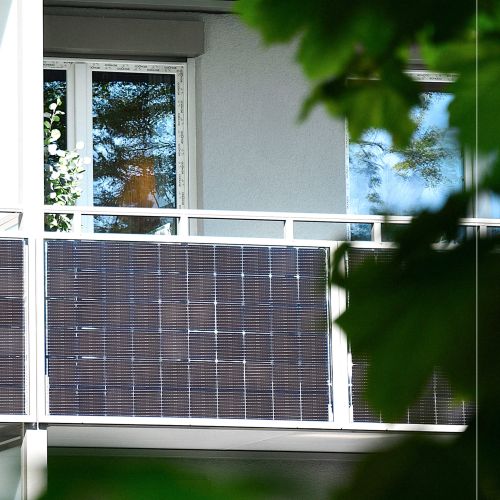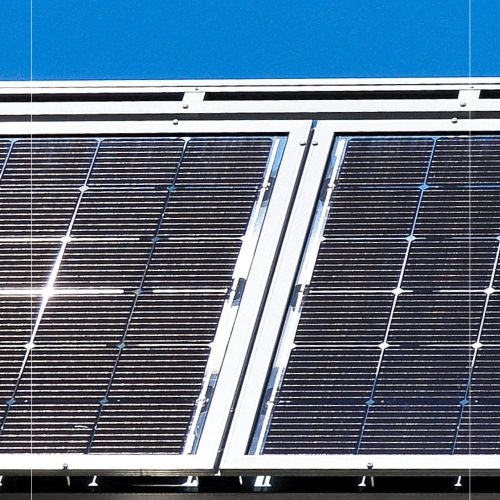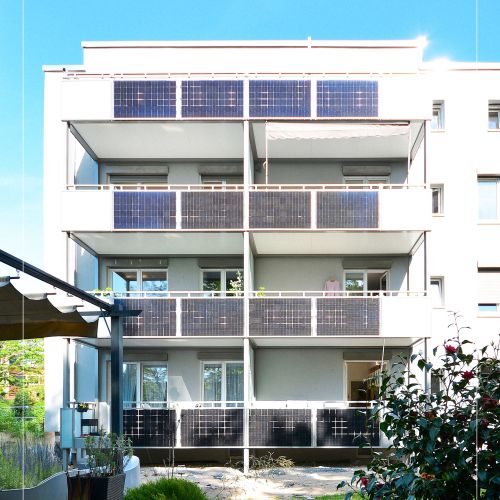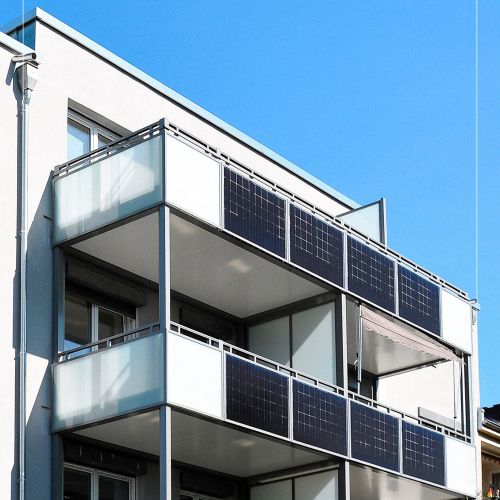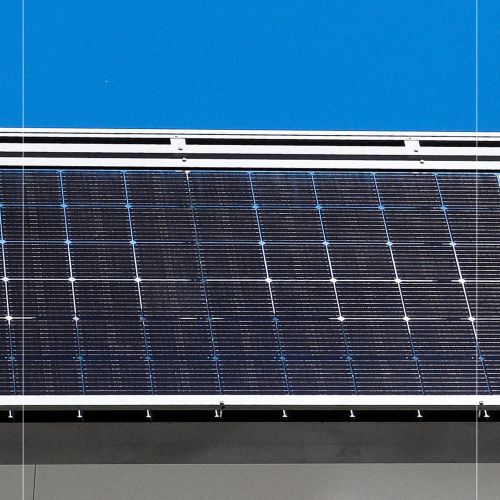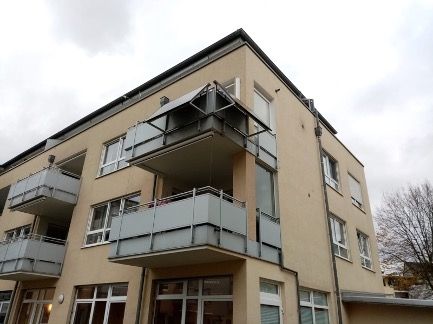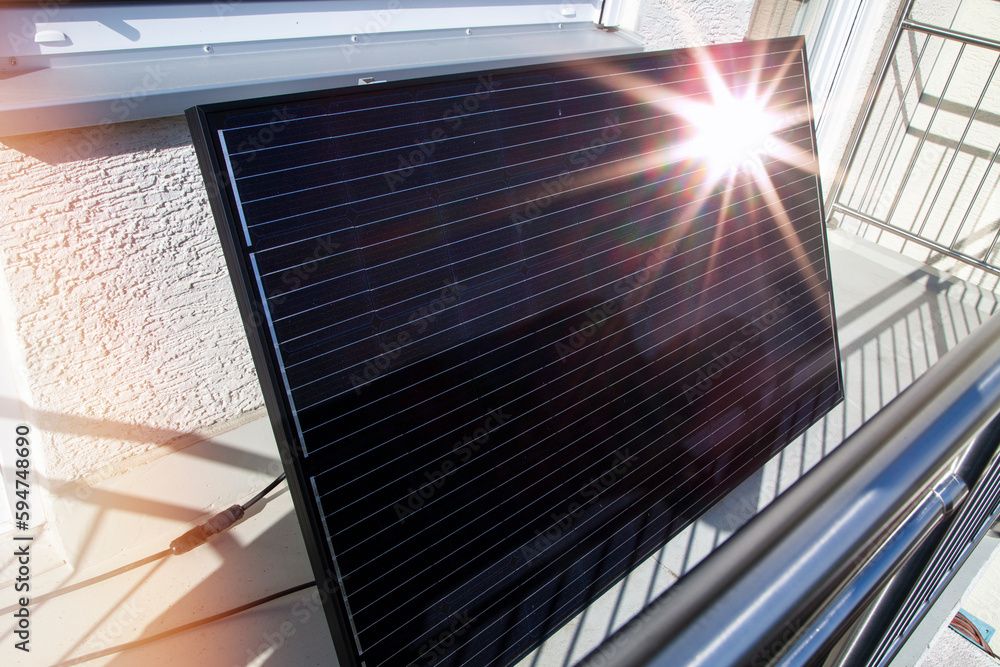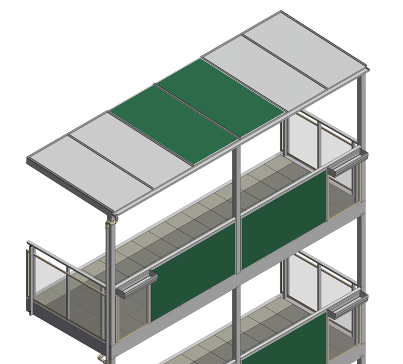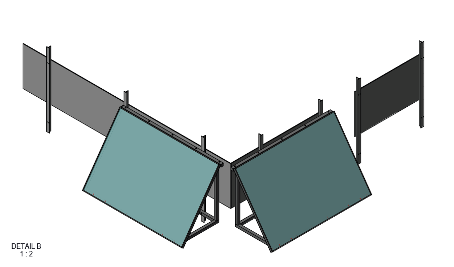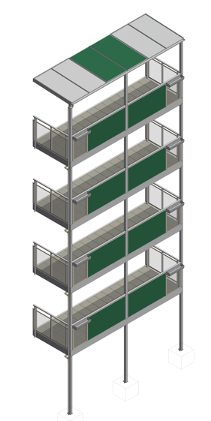HK Balcony Power.
We are happy to offer you ready-to-use balcony power stations for your balconies.
The advantages at a glance:
Reduction in energy costs
Amortisation after approx. 6-7 years
A balcony power station is a renewable and environmentally friendly source of energy
Regional subsidy programmes
0% value added tax
Simple registration
Increase in the value of the property
Our solutions as a specialised company:
- Up to 800 watts per balcony, up to 435 W (peak) per solar module, approx. 2 m² per module
- Static dimensioning and installation by us as a specialised company
- Constructive protection against glass breakage and falling fragments, compliance with DIN 18008 (glass in construction) and LBO
- Wind and fire-proof installation
- Of course, we also supply the inverter, the associated cabling and the safe connection to the socket. If required, we can also provide support with utility company registration.
- Certified production in accordance with EN 1090
- More than 40 years of metal construction experience
System-integrated installation
Our HK balcony power plants can be integrated into our railing system or roof system, or retrofitted in front of it.
- Innovative photovoltaic modules without glass
- The prismatic surface of the modules enables efficient power generation even when mounted vertically
- The solar modules are combined as a sandwich element with the structurally load-bearing railing infill and framed with our special profiles. This allows the solar panel to be elegantly integrated into our railing system or retrofitted in a visually appealing way.
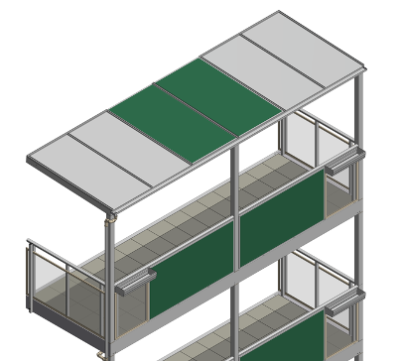
Inclined mounting
Alternatively, we offer substructures for the installation of solar panels that are customised to your balcony and aligned and inclined according to the course of the sun.
The substructures made of powder-coated aluminium are statically calculated and individually designed for your balcony. A 65-75° inclination of the modules optimises the usage yield.
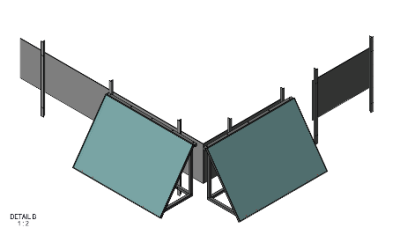
Further information about balcony power stations:
A balcony power plant has many advantages for the environment and for you as a landlord or consumer:
- The energy transition in Germany requires the increased use of renewable energies, and balcony parapets are considered a suitable installation site for solar systems. Balcony power plants reduce CO2 emissions, replace fossil fuels and, according to the Fraunhofer Institute, save around 500 kilograms of CO2 per kilowatt peak (kWp) of a balcony solar module per year.
- This decentralised energy supply promotes autonomy and independence from public grids, reduces the load on the grid and minimises the risk of power outages.
- Due to the complex legal situation, it is advisable to commission a specialised company in order to avoid risks for owners, landlords and administrators.
- The use of balcony power plants lowers the electricity costs of properties, reduces CO2 emissions and increases the attractiveness for tenants and landlords.
How balcony solar systems work:
The plug-in solar system, also known as a plug-and-play solar system, is a simple solution for generating solar energy. It consists of solar modules that convert sunlight into electrical energy and an integrated inverter. The solar modules, equipped with photovoltaic cells, are placed in an outdoor location exposed to the sun. The inverter converts the direct current (DC) generated into the alternating current (AC) required for household use. The plug-in solar system is fed directly into a building's electricity grid and the electricity generated can be used immediately by electrical appliances. Watt peak (Wp) is a unit of measurement that indicates the nominal output of solar modules.
Power distribution:
- The solar modules placed on the balcony or in a sunny outdoor location convert sunlight into direct current (DC).
The direct current is fed via cable to the integrated inverter, which converts it into the alternating current (AC) required for household use.
The alternating current generated is fed into the household power grid via the socket cable or plug to make it available to all electrical appliances in the household.
The electricity generated is primarily used for the household's own consumption in order to reduce the consumption of electricity from the public grid and save electricity costs.
Surplus electricity can be fed into the public grid, depending on local regulations. The energy fed into the grid can be remunerated by the energy supplier.
It is important to note that the exact connection and wiring of the balcony power station to the household power grid may depend on local laws and regulations. A qualified electrician or solar installer should be consulted to adapt the installation to the relevant standards and norms. In Germany, electricity is measured via balancing meters, regardless of the phase on which the module is operating. The module causes the electricity meter to rotate more slowly, which reduces the total electricity consumption.
Cost saving potential:
The actual savings from a balcony power plant vary depending on the installed capacity, the household's electricity consumption, the solar input at the location, the feed-in tariff (if available) and the local electricity prices. It is therefore difficult to give an exact figure. The energy generated is mainly used for the household's own consumption, which leads to a reduction in grid electricity consumption and potential savings in electricity costs.
Service life of solar systems
The lifespan of a solar system depends on various factors, including the quality of the components, installation, maintenance and environmental conditions. In general, the lifespan of solar modules is 25 to 30 years, with most manufacturers offering warranties for 20 to 25 years with certain minimum performance standards. Other components such as inverters and mounting systems often have a shorter lifespan of 10 to 20 years. It is important to note that the lifespan of a solar installation does not mean that it will stop producing energy after this time. Solar modules can continue to produce energy beyond their rated lifetime, albeit at a slightly lower efficiency. As a rule, solar modules lose a little power over time, but remain economically viable for many years.
Power generation:
The electricity production of solar modules is influenced by several factors, including the installed power, solar radiation, orientation, inclination, temperature and efficiency. The installed power is measured in watt peak (Wp) and indicates the nominal power under standardised test conditions. Optimum orientation to the south and inclination according to the latitude of the location can improve electricity production. The efficiency of the modules also influences the output, whereby high-quality modules with a higher efficiency can generate more electricity per installed watt peak. As a rough guide, a 1 kWp solar module in Central Europe can produce around 900 to 1,100 kWh per year under average conditions, although these values can vary depending on the location.
Reduced performance in winter
A balcony power plant can also produce electricity in winter, but electricity production is generally lower than in the sunny summer months. The amount of electricity produced depends on factors such as solar radiation, temperature and the inclination of the solar modules. Although solar radiation is lower in winter and the days are shorter, solar modules also generate energy in diffuse light conditions, even on cloudy days, albeit to a lesser extent. Lower temperatures can slightly increase the efficiency of solar modules, and optimising the tilt of the modules can improve light capture, even in flatter sunlight in winter.


